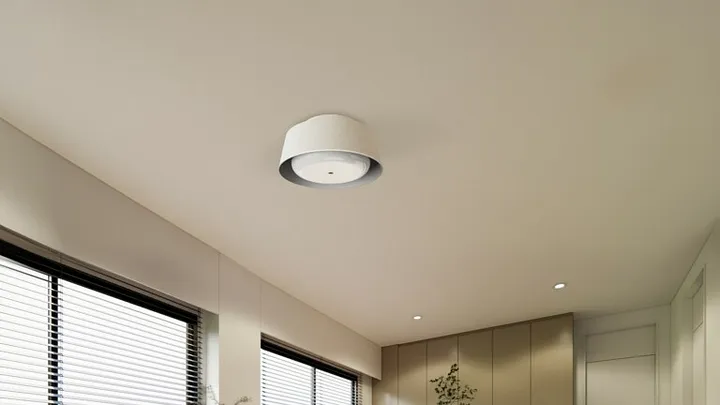Combining elegant design with cutting-edge AI technology is the Nobi Ceiling smart lamp. It can detect and prevent falls while monitoring the health and activity patterns of older adults.
As we age, we may face the risk of falling and injuring ourselves at home. Falls are one of the leading causes of death and disability among older adults, and they can have devastating consequences for their physical and mental health. That’s why I was intrigued by the Nobi Ceiling Fall-Detecting & Preventing Smart Lamp, a device that claims to help seniors live more independently and safely at home.

Nobi is a smart lamp that can be installed on the ceiling of any room. It looks like an ordinary lamp, but it has a lot of features that make it more than just a light source. Nobi uses optical sensors and artificial intelligence to monitor the activity and health patterns of the user, and to detect and prevent falls.
How does Nobi work?

Nobi works by using a combination of sensors and software to analyze the images and sounds in the room. It can recognize the user’s face, voice, posture, and movements, and it can distinguish between normal and abnormal situations. Nobi can also communicate with the user and other devices through voice and text messages.
Nobi has four main functions:
- Fall prevention: Nobi helps prevent falls by providing automatic lighting when the user gets up at night, and by supporting a natural circadian rhythm with adaptive lighting. Nobi can also remind the user to take their medication, drink water, or exercise, and it can alert caregivers if the user leaves their room or stays in bed for too long.
- Fall detection: Nobi can detect falls with 100% accuracy, according to the company. If a fall occurs, Nobi will ask the user if they are okay, and if they need help. If the user does not respond, or if they ask for help, Nobi will notify the caregivers or emergency services, and provide them with privacy-protected images of the situation. Nobi can also activate an alarm or a flashing light to attract attention.
- Health monitoring: Nobi can monitor the user’s vital signs, such as heart rate, blood pressure, and oxygen saturation, by using a wearable device or a smartwatch. Nobi can also track the user’s activity level, sleep quality, and mood, and provide feedback and suggestions to improve their well-being. Nobi can also detect signs of illness, such as fever, cough, or shortness of breath, and advise the user to seek medical attention if needed.
- Social interaction: Nobi can provide social and emotional support to the user, by engaging them in conversation, playing music, games, or podcasts, or connecting them with their family and friends. Nobi can also help the user with daily tasks, such as checking the weather, the news, or their calendar, or controlling other smart devices in the home.
What are the benefits of Nobi?

Nobi has several benefits for both the user and the caregivers, such as:
- Safety and security: Nobi can help reduce the risk of falls and injuries, and provide quick and effective assistance in case of an emergency. Nobi can also help prevent isolation and loneliness, and enhance the user’s sense of safety and security at home.
- Independence and dignity: Nobi can help the user maintain their independence and dignity, by allowing them to stay in their own home and environment, and by respecting their privacy and preferences. Nobi can also help the user improve their physical and mental health, and their quality of life.
- Peace of mind and convenience: Nobi can help the caregivers feel more confident and relaxed, by reducing their workload and stress, and by keeping them informed and involved in the user’s care. Nobi can also help the caregivers provide more personalized and efficient care, and improve their relationship with the user.
What are the drawbacks of Nobi?

Nobi is not without its drawbacks, such as:
- Cost and availability: Nobi is not yet available for purchase, and the company has not announced the price or the launch date. However, based on similar products in the market, Nobi is likely to be expensive, and it may not be affordable or accessible for everyone. Nobi may also require a subscription fee or a service contract, which could add to the cost and complexity of using it.
- Reliability and compatibility: Nobi relies on internet connection, electricity, and software updates to function properly. If any of these fail, Nobi may not work as expected, or it may stop working altogether. Nobi may also not be compatible with some devices, platforms, or services, which could limit its functionality and usability.
- Privacy and ethics: Nobi collects and processes a lot of personal and sensitive data from the user and the caregivers, such as images, sounds, health information, and preferences. Nobi claims to protect the privacy and security of the data, by using encryption, local storage, and user consent. However, there may still be risks of data breaches, hacking, or misuse, which could compromise the user’s privacy and rights. Nobi may also raise ethical questions, such as who owns the data, who can access it, and how it can be used.
Conclusion
Nobi is a smart lamp that aims to help seniors live more independently and safely at home, by detecting and preventing falls, monitoring their health, and providing social and emotional support. Nobi has many benefits for both the user and the caregivers, but it also has some drawbacks, such as cost, reliability, and privacy. Nobi is not yet available for purchase, and the company has not announced the price or the launch date. However, Nobi is a promising device that could revolutionize the way we care for our aging loved ones.


![The 6 Best LED LCD TVs Of 2022 [Buyer’s Guide ]](/wp-content/uploads/2022/03/The-6-Best-LED-LCD-TVs-Of-2022-Buyers-Guide--300x137.jpg)
![The 6 Best Gaming Monitors Under $300 Of 2022 [Buyer’s Guide]](/wp-content/uploads/2022/04/The-6-Best-Gaming-Monitors-Under-300-Of-2022-Buyers-Guide-300x200.jpg)
![The 5 Best MMO Mice - 251 Tested Of 2022 [Buyer’s Guide]](/wp-content/uploads/2022/04/The-5-Best-MMO-Mice-251-Tested-Of-2022-Buyers-Guide-300x169.jpg)